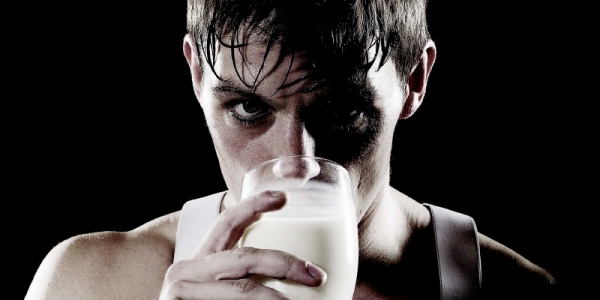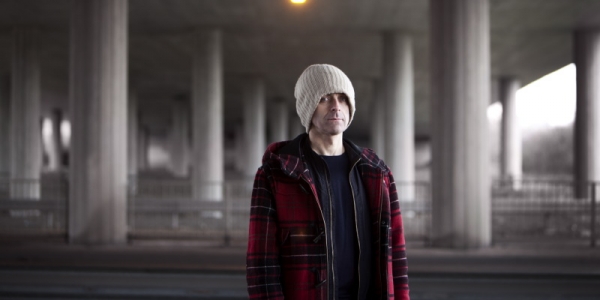“I thought the book was really subversive when I first read it,” Spencer-Jones says. “But it’s interesting that as an adult I didn’t read it that way.” Spencer-Jones grew up in a working-class region of England and while she says her own upbringing was relatively stable, Spencer-Jones was aware of children around her whose dysfunctional upbringing could have led to the evolution of a character like Alex DeLarge. “I’ve never met Alex DeLarge,” Spencer-Jones says, “but I was at primary school with people with very difficult home lives. I was fortunate enough to have a strong parenting system, but I saw lots of people who had had a parent leave home, and who didn’t have that stability.”
Ten years after she first read the book, Spencer-Jones was given the opportunity to direct Action Is the Word’s contemporary production of A Clockwork Orange. A critical success in England, the production features a 10-member all-male cast, nine of whom play a total of 74 different parts. “A more stable group of actors you couldn’t hope to meet!” Spencer-Jones laughs. “They’re certainly not rough boys.”
A Clockwork Orange is divided into two notional parts: the first describes Alex’s violent activities, including the rape of two ten-year-old girls; the second covers Alex’s arrest and purported ‘rehabilitation’ at the hands of the prison psychiatrist Dr Brodsky. “In the first half of the book Alex owns his own friends,” Spencer-Jones says. “But when he goes into gaol in the punishment part of the book, he realises that there’s always someone bigger than you.”
It’s the first half of the book – aided and abetted by Stanley Kubrick’s vivid and provocative cinematic version of the book – that tends to define images of Alex. But Burgess’s themes are equally more subtle and more provocative than Kubrick’s film: in some respects, Burgess almost excuses Alex’s antics on the basis of his age, and his dysfunctional upbringing. “I think that Burgess captures the confused nature of not just adolescence, but of humanity full stop,” Spencer-Jones says. “When you look at the full novel [Kubrick’s film was based on the US version of the novel, which excluded the final chapter in which Alex decides to leave his psychotic ways], it does absolve Alex of his crimes, so that in that last chapter he shrugs off his crimes as the consequence of adolescence.”
Burgess wrote A Clockwork Orange at a time when the ‘teenager’ had just become a significant sociological concept: building on JD Salinger’s A Catcher in the Rye, the cinematic images of James Dean and Marlon Brando constructed the notion of the teenager as an outsider, and a potential menace to society. Criminologists waged academic battles on the nature of crime and its underlying social and pathological causes; politicians wavered between compassionate attention and retributive policies. For anyone familiar with the standard fare of the tabloid media, it’s an all-too familiar formula – and we’re still none the wiser.
Spencer-Jones thinks that the pressures of adolescence remain just as difficult as they were at the time Burgess wrote his novel. “My mum and dad were both adolescents in the ‘60s, and I’ve spoken to them extensively about it as I’ve been doing the play,” she says. “I think as social media has expanded, then the pressure on young people to have the latest phone, or fashion statement or whatever has only increased. It was no surprise during the London riots that young people were smashing shop windows and stealing the latest things in the window.”
In an event of serious serendipity, A Clockwork Orange was being performed at the very time the London riots were going on. “There is a line in the book that refers to riots in the West End, and the people in the audience were seeing images of the riots at night, and they thought we were improvising in the play – but it was actually there in the book,” Spencer-Jones says. “I think the most interesting thing about the riots was the lack of progress that we’ve made since the ‘60s. Kids will always be the focus of blame, but A Clockwork Orange turns that around and says to society ‘you made us like this’. When you look at the government figure in the book, he’s just as much a villain as Alex is.”
With the exception of the all-male cast – an aspect of the production Spencer-Jones says initially drew the suspicion of the estate of Anthony Burgess, who feared the female characters would be parodied (“they came to the see the play, and they fell in love with it,” Spencer-Jones says), and the use of music (as he rapes a woman in a laneway, Alex imagines himself in an ‘80s pop song) – Spencer-Jones says the dramatic production stays true to the book. “There’s hardly any part of it that’s dated,” she says. “He plays records, so that’s changed, but that’s the only thing that jumps out at you. And Alex’s dialogue leaves a lot up to you. And his droogs are ‘dressed in the very height of fashion’.”
BY PATRICK EMERY

